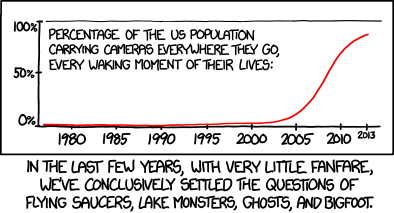According to a recent Pew Research poll, more than a third of adults in the United States persist in the remarkably silly belief that humankind has existed since about five days after God separated the light from the darkness, some time around 6,000 years ago. Another quarter of us believe that evolution exists, but is more likely to be guided by God than by natural forces. Fortunately, there’s a group that has managed to reach a majority decision within itself that evolution, free of divine influence, is their story of choice. It’s called “young people:” 51% of Americans under the age of 30 chose ‘secular evolution’ when asked by Pew.
In fact, America as a whole is getting less religious. According to a different Pew poll, the number of Americans who identify as “atheist,” “agnostic,” or “no particular affiliation” just by 19 million over the last eight years. The largest group to switch to ‘none,’ as one might expect, is the youth: 36% of modern young adults (18-24) fit into the three categories above.
To contrast, however, Americans are becoming more spiritual at the same time that they become less religious. The number of U.S. citizens polled who feel “a deep sense of spiritual well-being at least once a week” rose from 52% to 59% since 2007, and the number who feel “a deep sense of wonder about the universe” rose from 39% to 46%.
Welcome to the Internet
One of the forces most credited with this fundamental shift: the amazing surge in knowledge sharing that began with the Internet and has continued with the development of the smartphone and apps like Vine and Twitter. In The Wall Street Journal last April, Daniel Dennett of the Tufts University’s Center for Cognitive Studies said “What is particularly corrosive to religion isn’t just the newly available information that can be unearthed by the curious, but the ambient knowledge that is shared by the general populace.”
Alternatively, as (in)famous webcomic XKCD‘s author Randall Munroe might have put it:

In other words, the same phenomenon that is leading us all to understand the problem with police violence is also leading us all to understand that those things we associate with religion — miracles, angelic visitors, and so on — simply aren’t out there. Either that or they’re ridiculously good at not showing up on smartphone cameras.
Misunderstandings that Undermine the Theory of Evolution
There are a huge number of issues that the single question of ‘creationism vs. evolution’ is essentially representative of. Unfortunately, most of those issues are very commonly misunderstood. Here are a few key examples of common misunderstandings about evolution:
- “Evolution is just a theory.” — This is just a silly definitional problem. ‘Theory’ in scientific parlance doesn’t mean the same thing that ‘Theory’ means in regular use. A scientific ‘Theory’ is ‘an idea that has been tested repeatedly and held up under all scrutiny that we’ve managed to throw at it.’ Just like the theory of Gravity.
- “Evolution has never happened while humans were watching.” — Entirely not true. There have been scores of examples of animals evolving as we watched, including several that humans deliberately initiated and watched carefully.
- “Evolution has never found the ‘missing link’ between humans and apes.” — Actually, they found it in 1891 — within 30 years of the first man to claim that a link was missing in the first place. Today, we have more fossil evidence of the ‘missing link’ than we do that Tyrannosaurus Rex existed.
- “The fossil record is woefully incomplete and there are gaps between almost every form of life, with no transitional fossils.” — Also untrue. Archaeopteryx is the transition between dinosaurs and birds, Therapsids are the intermediate form between reptiles and mammals, and Tiktaalik is the form that came in between fish and amphibians. There are some gaps in the fossil record — it would be miraculous if there weren’t any — but by a significant margin, most of the intermediate fossils that show evolution ‘in progress’ have been found.
- “Morality cannot spring from a strictly evolutionary history of the human species.” — Sorry, that’s been disproven as well. While morality cannot, in fact, survive in a “survival of the fittest” world, evolutionary biologists disproved the notion of an exclusively “fittest” world a long time ago. As it turns out, mammals (and primates in particular) use a biological strategy that revolves around cooperation, empathy, and even altruism: the very foundations of modern morality.
As these old cultural myths are perpetuated by the people who benefit from them, the children that are indoctrinated into them are the most likely to turn toward Creationist views of the world. But as the Internet and our other forms of advanced communication and information sharing allow more and more of those old myths to be laid to rest, the worldviews that rely on old or simply incorrect information are — thankfully — being laid to rest with them.
(Featured image courtesy of Vector Open Stock via Flickr, shared using a Creative Commons 2.0 license.)





